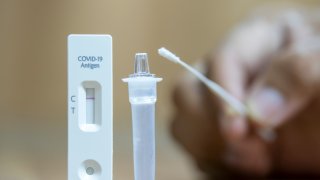
A COVID-19 infection has the ability to reach the male genital tract, causing health problems in the penis, testicles and prostate, according to a new study from Northwestern Medicine.
The study found that the coronavirus infection caused testicular pain, erectile dysfunction, reduced sperm count and decreased fertility in a number of subjects.
Northwestern warned that "millions" of men could be affected by the results of the study and that men previously infected with COVID should "evaluate their sexual health."
Previously, it was uncertain whether the fertility issues were due to fever and inflammation, which can accompany COVID. However, Northwestern's study using a PET scan showed the side effects were a direct result of the virus.
Feeling out of the loop? We'll catch you up on the Chicago news you need to know. Sign up for the weekly Chicago Catch-Up newsletter here.
“These results indicate that the testicular pain, erectile dysfunction, hypogonadism, reduced sperm count and quality, and decreased fertility associated with SARS-CoV-2 infection are a direct consequence of infection of cells of the male reproductive tract and not indirect mechanisms such as fever and inflammation,” said lead investigator Thomas Hope, professor of cell and developmental biology at Northwestern University Feinberg School of Medicine.
Hope added that mumps, Ebola, Zika, SARS-COV-1, as well as other viruses, can also infect the male genital tract and fertility.
According to the study, which was performed in large animal models, 10-20% of men infected with COVID-19 have symptoms related to male genital tract dysfunction.
Local
Northwestern said this finding means that tens of millions of men should visit a doctor to check their sexual health and fertility "to determine if additional therapies could prevent or diminish future problems."
“The potential impact of SARS-CoV-2 infection on sexual and reproductive health should be part of everyone’s decision to get vaccinated to minimize the chance of death, severe disease and hospitalization, and infection of the prostate, penis, testicles and vasculature (blood supply) of testicles,” Hope said.
Northwestern's study was the first PET probe able to identify the SARS-CoV-2 infection in a living animal, authors said in a release.
The Centers for Disease Control and Prevention has previously noted that pregnant women who contract COVID-19 "have an increased risk of severe illness," including the risk of an infection that could lead to ICU admission, mechanical ventilation, and possibly death.
Pregnant people with COVID-19 could also face an increased risk of adverse pregnancy outcomes, such as preterm birth, the agency added.
According to preliminary findings of a study from the National Institutes of Health, pregnant women who experienced severe symptoms of COVID-19 had a higher risk of complications during and after pregnancy.
"Compared to nonpregnant women who have the same health and age, a COVID-infected woman is about 1.3 to 1.4 times more likely to end up in the hospital when she's pregnant," Dr. Regan Theiler, a Mayo Clinic obstetrician, said in a statement.
On the other hand, the University of Chicago Medicine reports that for some people vaccinated late in their pregnancy, "it is likely that the antibodies your body produces in response to the vaccine will be passed to the fetus through the placenta and may provide some protection against COVID-19, the same way a flu vaccine can help protect your baby against the flu."



